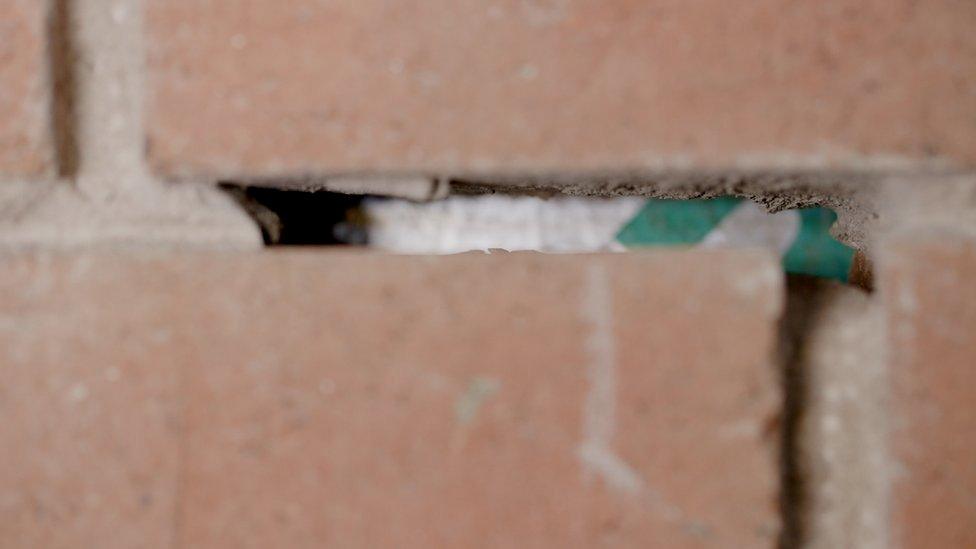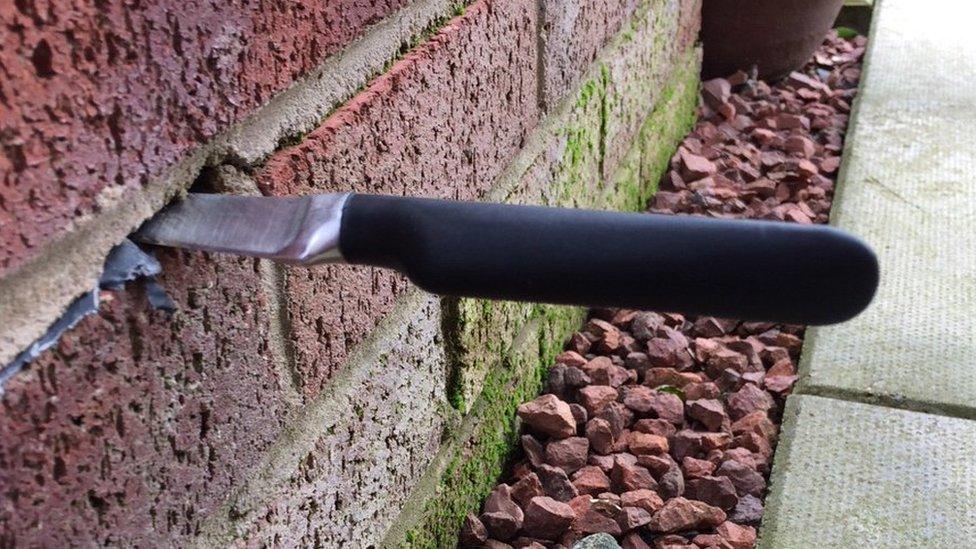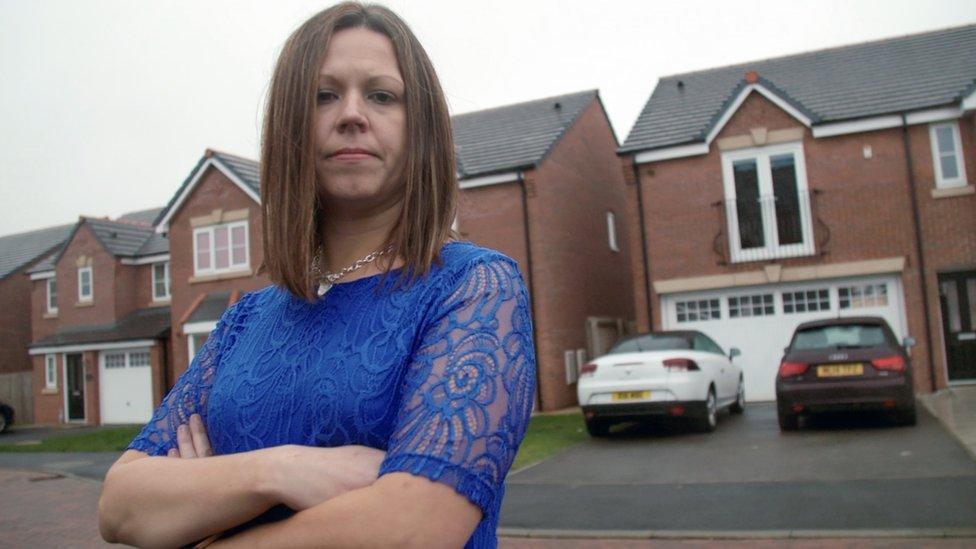New homes 'crumbling due to weak mortar'
- Published
- comments
Vincent Fascione says he will never buy a new build-home again
Hundreds of new properties have been built using weak mortar that does not meet recommended industry standards, the Victoria Derbyshire show has found.
There are reports of homes with the fault on at least 13 estates in the UK.
The full extent of the industry-wide problem is hard to measure as some homeowners have been asked to sign gagging orders to claim compensation.
The industry says mortar performance is a complex issue and can be affected by a number of factors.
One of those homes was owned by Vincent Fascione, 70. He says he was watching football on TV one evening in 2016 when he heard a loud cracking noise from the external walls of his house.
The next morning, he found a sand-like substance all over his front path and driveway. Photographs and video from the time appear to show growing cracks in the mortar holding his bricks together.
Mr Fascione, from Coatbridge outside Glasgow, bought his semi-detached property in 2012 for £112,500.
He complained to the homebuilder, Taylor Wimpey, and to the NHBC, the industry body that signs off and provides the warranty for most new-build houses.
'Disastrous'
Under NHBC guidelines, mortar in most areas of the UK should be made of one part cement to 5.5 parts sand.
In severe weather areas such as Coatbridge, there should be even more cement in the mix to make it stronger and more durable.

Mr Fascione says the mortar problem has been "a disaster" for him
Laboratory tests on samples taken from parts of Mr Fascione's home showed the amount of sand was almost three times higher than recommended.
"I'm the guy who retired and decided to buy a new-build house," he said. "I'll never buy a new-build house again - never. It's just been disastrous for me."
After 18 months of complaints, the NHBC bought back Mr Fascione's home at the market rate and he is living in alternative accommodation.
The organisation said it had done so because the performance of the company it had employed to repair the property had not been good enough and "in consideration of Mr Fascione's personal circumstances", not because of the original issue with the mortar.
'Widespread and serious'
The Victoria Derbyshire Programme has heard about new build properties in at least 13 estates from Scotland to Sussex, built by different companies, with what appears to be a similar problem.

Retired construction manager Phil Waller blogs about new homes
In one single estate in the Scottish borders, it is thought Taylor Wimpey has agreed to replace the mortar in more than 90 separate properties. The homebuilder says an assessment by engineers found "no structural issues" with the homes.
"This is both widespread and serious," says Phil Waller, a retired construction manager who has blogged about the problem. , external
"It cannot be explained away by the industry as a few isolated cases."
Exactly why the weaker building material may have been used is unclear.
In some cases, the housebuilder may have simply used the wrong type of mortar. In other cases, errors may have been made mixing and laying the material on site.
Some construction experts also blame the switch to a new type of factory-mixed mortar, which might pass a different strength test in the laboratory but not always be strong enough in the real world.
Steve Turner, from the Home Builders Federation, said builders "generally have their mortar provided by large accredited suppliers... [who] have clear quality assurance and testing processes to ensure mixes are delivered as required.
He added that there were "very few instances we're aware of where defective mortar has been used".
"And in those instances where it has been used, there's an obligation on the builder to fix the issues."
He added that having spoken to "a number of builders in the past week, most have had no issues with mortar whatsoever - [and with] those that have, it's on a very limited number of sites".
Non-disclosure agreements
Faced with what could be an expensive repair bill, many homeowners have been told by their own solicitors not to go public until the issue is resolved.
In some cases, customers have ultimately had their houses bought back by either the homebuilder or the NHBC.
In others, it appears repairs have been made and compensation paid as part of a deal that involves the signing of a non-disclosure agreement or gagging clause.
One homeowner in the north-west of England told the programme: "The only comment I can make is no comment. I'd like to speak out but at the end of the day I have to protect my investment."
A gagging clause may stop the property owner talking not only to the media but also to neighbours in the estate who may be facing similar problems.

Example of suspect mortar from a second estate in Scotland
"It's going on, it's just not being talked about," says Mr Waller.
"Non-disclosure agreements should be banned full stop. If it's all covered up, more victims are likely to be drawn into the net and make the same mistakes."
An NHBC spokesman said it included a confidentiality clause in a "small number of rare circumstances" but declined to disclose the number.
He added: "We work with builders to help them improve the construction quality of the homes they build. However, it is the builder who is ultimately responsible for the quality of the new homes they build."
Taylor Wimpey apologised to Mr Fascione for the issues experienced with his home.
A spokesman said: "We are committed to delivering excellent quality homes and achieving high levels of customer satisfaction. On those occasions where issues do arise, we endeavour to resolve those issues as soon as practically possible."

Follow the Victoria Derbyshire programme on Facebook, external and Twitter, external - and see more of our stories here.
- Published19 December 2017

- Published2 February 2017
